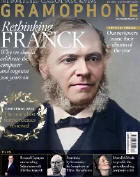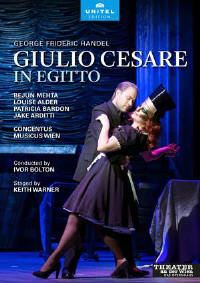Texte paru dans: / Appeared in: |
|
|
Outil de traduction |
|
|
There’s an unexpected opening to this Giulio Cesare, recorded in 2021 at the Theater an der Wien: a brief recitative for Cesare, pinched from the end of the opera, establishing Rome’s good intentions towards Egypt. Establishing, indeed, that as a historical context for the piece, since the Overture then immediately reveals the assembled company at a screening of a silent film in which the love story between Cesare and Cleopatra, for the only time in ‘period’ costume, is being played out, apparently to the discomfort of the actors watching in the stalls. Director Keith Warner has chosen to relate the classic opera seria conflict between political and amorous demands to the controlling tensions between public image and private loves inherent in celebrity culture. As the Overture ends, the ‘actors’ separate out into their ‘true’ characters, but Ashley Martin-Davis’s cinema set remains through the opera as a reminder of the false and the true: Cornelia and Sesto solemnly mourn Pompeo while newsreel of a papal funeral plays on screen behind them; Cleopatra appears to Cesare there dressed as Cupid; Tolomeo drugs up onstage while turning onscreen into a multicoloured octopus.
It’s a sound conception, executed with clever conceits – costume-changes prominent among them – and lively stage business that stops short of distracting from the emotional dramas which are of course the true source of this opera’s greatness. Personally I found the frequent glowering visitations from Pompeo’s shade irritating, but in general the production gently debunks its characters’ more questionable motivations with comedy while allowing the deeper emotions on display in the great set-piece arias to hit home. In this respect the much-admired (and Gramophone Award-winning) Glyndebourne production of 2005 (Opus Arte, 7/06) got a little too silly a little too often, and crucially failed to give us a Cleopatra who matures convincingly from self-interested schemer to someone capable of a noble love. This one certainly achieves that. Cleopatra’s ‘Se pietà’ – in which, looking in the mirror, she rejects one by one the kinky disguises she had previously used in her seductions – leaves no doubt of it, especially when sung so feelingly by Louise Alder. Which brings us to the musical performances themselves, and very strong they are. Alder is outstanding, her rich tone and smooth vocal agility a delight to hear (‘Da tempeste’ is a showstopper), her acting skills captivating and authentic. This role deserves to be a triumph for her as much as it was for Glyndebourne’s Danielle de Niese. Bejun Mehta is less comfortable in his passagework, especially lower down (a common problem for countertenors in this role, best solved by using a mezzo, as Glyndebourne did with the superb Sarah Connolly), but he has a wondrous beauty of timbre, and the soulfulness of his ‘Aure deh, per pietà’ is a crowning highlight; while far from a warlike moment, it is his most personally heroic. Two other countertenors are also vocally impressive: Christophe Dumaux, reviving the role he took at Glyndebourne, is a terrifically sleezy Tolomeo crowing over his shortlived victories, and Jake Arditti convinces as Sesto, gradually morphing from teenage book-nerd to decisive avenger of his father. Patricia Bardon’s Cornelia is a traumatised widow, less dignified than she was allowed to be at Glyndebourne, but still sings ‘Nel tuo seno’ with immense nobility. There are good performances, too, in the remaining three roles, though each loses out to cuts in the score.
Ivor Bolton is an assured hand in the pit, skilfully pointing up expressive details in the music and drawing from the Vienna Concentus Musicus the brusque, primarycolour earthiness it had under its founder, Nikolaus Harnoncourt. Efficiently filmed by Tiziano Mancini, this film is a worthy rival to Glyndebourne’s. Both are certainly worth three hours of your time.
|
|




